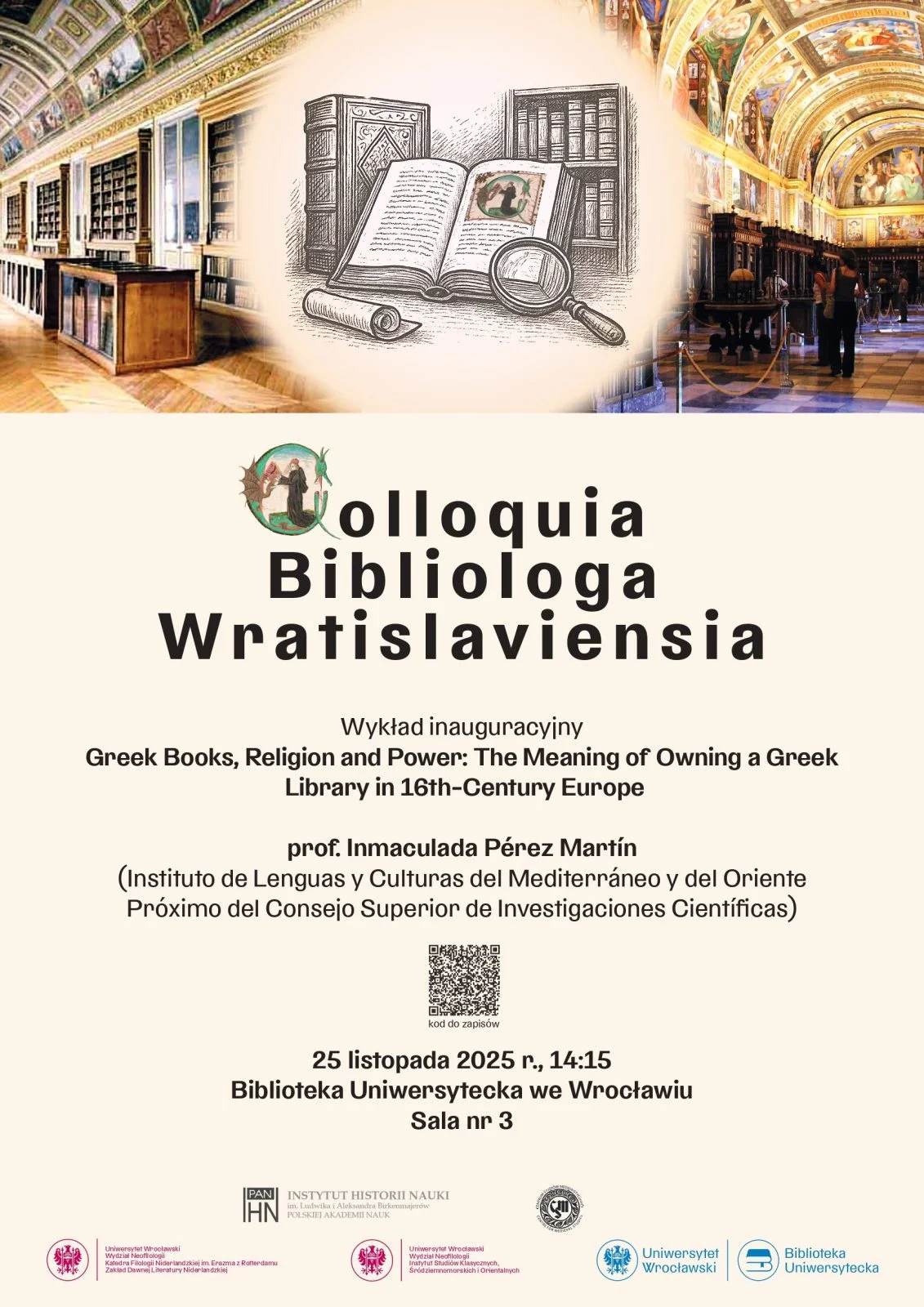
The University Library invites to a lecture series
The University Library in Wrocław invites you on 25 November at 2.15 p.m. to conference room no. 3 of the Library of the University of Wrocław (BUWr) for the first lecture in the new series Colloquia Bibliologa Wratislaviensia, dedicated to the history of the early book, manuscripts, writing culture, and libraries. Registration is required.
The aim of the series is to create a space for meetings and dialogue among researchers, librarians, students, and all those interested in the culture of the book—its material, intellectual, and spiritual dimensions. The meetings will feature talks by renowned scholars from Poland and abroad, representing diverse research perspectives and academic traditions. Colloquia Bibliologa Wratislaviensia will serve as a forum for exchanging ideas on the role of the book in the history of civilisation, on transformations in the librarian-scholar’s craft, and on how book collections shaped the identities of nations, institutions, and elites.
The inaugural lecture will be delivered by Professor Inmaculada Pérez Martín, a distinguished Byzantinist. Her research focuses on the transmission of scholarly knowledge in Byzantium, Greek palaeography, codicology, and the dissemination of Byzantine texts. She has herself edited works from the Byzantine era. From 2009 to 2017 she served as President of the Sociedad Española de Bizantinística, and since 2017 she has been its Vice-President. Between 2013 and 2019 she was also the editor-in-chief of the journal Estudios Bizantinos, published by the University of Barcelona. She has taken part in numerous research projects, including the Mabilus project (concluded in 2024), devoted to Byzantine illuminated manuscripts held in Spain. She has also led several grants, most recently the DIGITES project, aimed at making accessible to the scholarly world the Byzantine manuscripts preserved in El Escorial. She has been a Harvard University fellow on several occasions, undertaking long-term research stays. In addition to numerous articles and book chapters in the fields of codicology and textual criticism, she is the author of several monographs, including one translated into English and published by Harvard University Press. During her visit to the University of Wrocław, Professor Inmaculada Pérez Martín will primarily work in the Special Collections Reading Room of the University Library, studying Greek manuscripts, of which approximately 40–50 volumes are held in the Manuscripts Department of BUWr.
As part of the Colloquia Bibliologa Wratislaviensia series, professor Pérez Martín will deliver a lecture entitled Greek Books, Religion and Power: The Meaning of Owning a Greek Library in 16th-Century Europe.
The lecture will address the role that the collecting of books played in the early modern period, particularly in the context of the political and religious ambitions of European monarchs.
In the 16th century, the establishment of royal and aristocratic libraries became an important element of strategies of power and prestige. Inspired by the humanist ideal of universal knowledge, rulers—kings, princes, and magnates—competed to assemble the richest possible collections of manuscripts and printed works in ancient languages. Their holdings included not only works of classical literature, but also texts on the history of Christianity and the knowledge of ancient civilisations—Babylonian, Egyptian, and Greek.
To obtain the most valuable volumes, monarchs created extensive networks of diplomatic contacts, organised research expeditions to the eastern Mediterranean, collaborated with scribes and printers, exchanged catalogues, and sought advice from scholars on the organisation of their collections. Within their own territories they were equally determined in expanding their libraries, dispatching trusted agents to monasteries, private libraries, and scholarly collectors to acquire the most precious manuscripts, often through confiscation or coerced purchase.
As Professor Inmaculada Pérez Martín demonstrates, this Renaissance ideal of universal knowledge gradually evolved. With the intensification of Reformation debates, libraries began to assume the function of instruments of ideological control, becoming spaces where knowledge and religion intersected with politics and power.
The lecture will explore how the concepts of these “universal libraries” were designed, how they evolved in response to changing religious and political conditions, and what significance the possession of a Greek library held for building a ruler’s prestige and authority in 16th-century Europe.
The inaugural meeting of the Colloquia Bibliologa Wratislaviensia series will open a new space for collaboration and reflection on the history of the book, writing culture, and libraries. In the coming months, presentations by scholars from leading European research centres, historians, palaeographers, library scientists, and manuscript conservators are planned. Each will offer a different perspective on the relationship between textual culture and social, religious, and political change.
We warmly invite you to this exceptional event, which opens a new chapter in the scholarly life of the Library of the University of Wrocław – meeting that will unite the tradition of book studies with the passion for uncovering Europe’s written heritage.

Date of publication: 21.11.2025
Added by: M.J.



